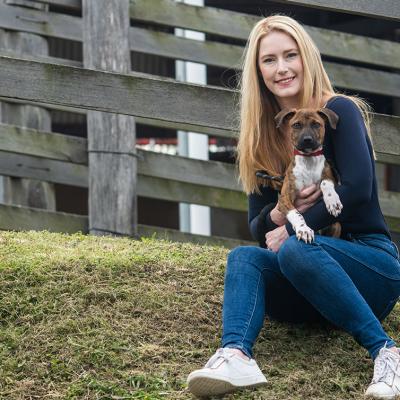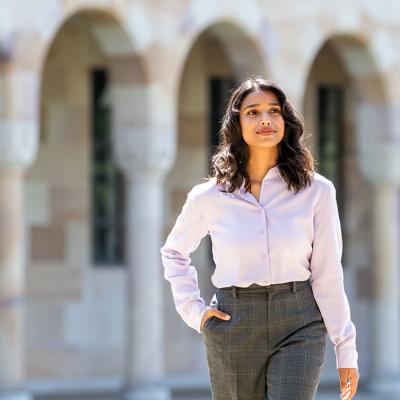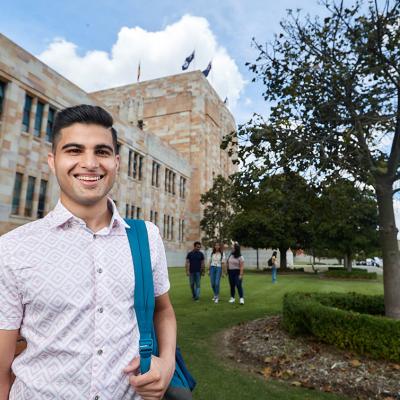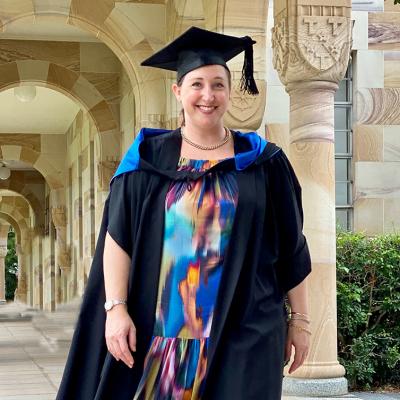Zoë Black, Master of Business Administration, is forging friendships between rescue animals and socially isolated people.
People need animals, and vice versa.
Typically, volunteers play the role of looking after abandoned pets, while trained animals such as therapy dogs get sent to people who require them. This system might work fine for those who receive the help they need, but it struggles to cover everyone – and that’s the gap Zoë Black, cofounder of the Happy Paws Happy Hearts (HPHH) Foundation, is trying to fix.
“On the one hand, there’s a growing number of Australians experiencing social isolation or deep social exclusion,” says Zoë.
“On the other hand, there are tens of thousands of rescue animals waiting in shelters for extra hands-on time and attention.”
Zoë and HPHH are flipping the standard model on its head for the benefit of both parties. Largely inspired by the Brisbane RSPCA Animal Care Campus, the foundation brings vulnerable animals and people together to help each other.
“We run our programs from training rooms at rescue shelters, so we can work with more people and more animals recovering together,” says Zoë.
“We decided to ‘reverse’ animal therapy.”
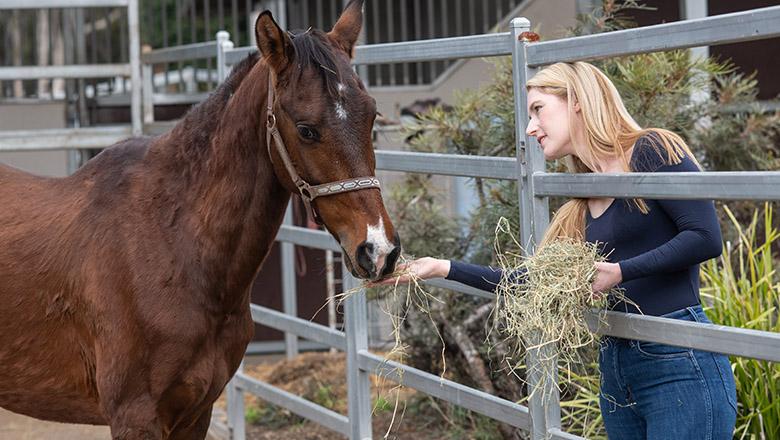
A positive impact on people and paws alike
HPHH refers to its humans as hearts and its animals as paws. Make no mistake though, the family also includes talons, webbed feet and the occasional hoof. Zoë feels the foundation’s work makes a remarkable difference for everyone involved – whether on two feet, four feet or no feet at all (yep, snakes need love too).
“We see improved confidence, social networks and skills that can ultimately lead to work, education or community roles,” she says.
“We also hear about positive changes in home relationships.”
The foundation seems to change lives daily, so it’s difficult for Zoë to recall a single most memorable participant.
“There are so many, and I’m regularly taken aback by the impact the organisation is having,” she says.
“Recently, one of our younger participants named Chaya has progressed to interview for a job at a local nature centre. This is such a transformation from the young woman I met a few years ago entering our programs.”
“Working with rescue animals is rewarding and purposeful.”
The effect on the animals is incredible, too. Zoë frequently observes a creature’s involvement as a wonderful parallel or reflection of the person’s experience.
“The animals are on their own recovery journey and rebuilding their trust in humans,” she says.
“This echoes what many of our participants are doing, so this forms a powerful connection."
“We’ve delivered over 11,000 hours in animal training, enrichment and socialisation time for rescue animals so far. This work makes the animal’s time at a shelter more comfortable, plus it sets them up to be adopted successfully.”

Connections more crucial amid the coronavirus
The pandemic has plagued many of us with excess alone time and stress. It was unsurprising for Zoë that many people and families adopted pets during this period.
“We were obviously thrilled to see so many rescue animals find homes in the lead up to the large lockdown in 2020,” she says.
“I could see the appeal, because everyone knew they’d have the time to properly welcome them into the family."
“We just hope people continue to adopt before they shop, because we’re still seeing animals at the shelter coming from horrible backgrounds in puppy factories and such.”
But COVID-19 hit hard for those who were already socially excluded and couldn’t take on the responsibility of a new pet. HPHH had to adapt to keep delivering programs and engaging participants who faced more social barriers than before.
“For people who were already attempting to recover from complex circumstances, it has made it even more difficult to do so,” says Zoë.
“We’ve released dedicated online programs to slowly work people up to having the confidence to attend in person.”
Now, as the world gradually steps outside the shroud of COVID-19, HPHH can continue its work with confidence. Zoë’s ambition is for the foundation to expand nationally and reach thousands of hearts and paws (all while finding personal time to learn guitar, pick up a new language and maybe even take an adventurous Aussie holiday).
It’s a big dream, and it’s something she hadn’t even considered prior to studying her Master of Business Administration.
“It was through my MBA that I first came across the concept of a social enterprise and I thought wow, I can do business with impact,” says Zoë.
With each participant transformed and animal adopted, Zoë is paving the way to her dream and setting an example for those of us with similar ambitions for making a meaningful change in the world.
“It felt like my commercial career and social heart could come together and take me on a really rewarding life path.”
Discover UQ's Master of Business Administration Explore all of UQ's postgraduate study options


